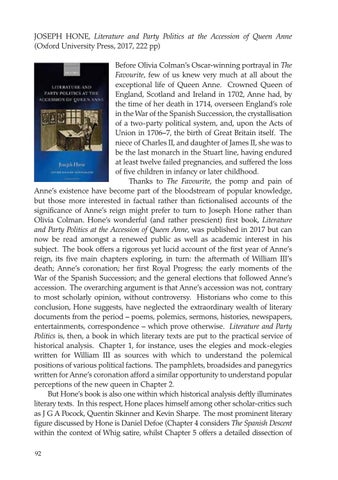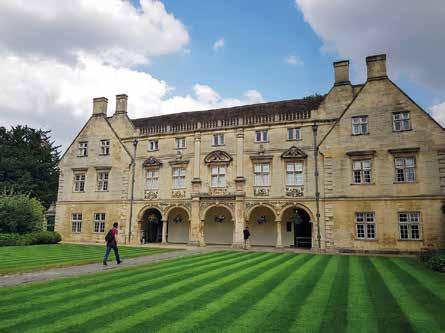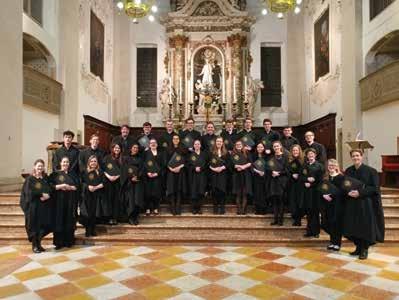JOSEPH HONE, Literature and Party Politics at the Accession of Queen Anne (Oxford University Press, 2017, 222 pp) Before Olivia Colman’s Oscar-winning portrayal in The Favourite, few of us knew very much at all about the exceptional life of Queen Anne. Crowned Queen of England, Scotland and Ireland in 1702, Anne had, by the time of her death in 1714, overseen England’s role in the War of the Spanish Succession, the crystallisation of a two-party political system, and, upon the Acts of Union in 1706–7, the birth of Great Britain itself. The niece of Charles II, and daughter of James II, she was to be the last monarch in the Stuart line, having endured at least twelve failed pregnancies, and suffered the loss of five children in infancy or later childhood. Thanks to The Favourite, the pomp and pain of Anne’s existence have become part of the bloodstream of popular knowledge, but those more interested in factual rather than fictionalised accounts of the significance of Anne’s reign might prefer to turn to Joseph Hone rather than Olivia Colman. Hone’s wonderful (and rather prescient) first book, Literature and Party Politics at the Accession of Queen Anne, was published in 2017 but can now be read amongst a renewed public as well as academic interest in his subject. The book offers a rigorous yet lucid account of the first year of Anne’s reign, its five main chapters exploring, in turn: the aftermath of William III’s death; Anne’s coronation; her first Royal Progress; the early moments of the War of the Spanish Succession; and the general elections that followed Anne’s accession. The overarching argument is that Anne’s accession was not, contrary to most scholarly opinion, without controversy. Historians who come to this conclusion, Hone suggests, have neglected the extraordinary wealth of literary documents from the period – poems, polemics, sermons, histories, newspapers, entertainments, correspondence – which prove otherwise. Literature and Party Politics is, then, a book in which literary texts are put to the practical service of historical analysis. Chapter 1, for instance, uses the elegies and mock-elegies written for William III as sources with which to understand the polemical positions of various political factions. The pamphlets, broadsides and panegyrics written for Anne’s coronation afford a similar opportunity to understand popular perceptions of the new queen in Chapter 2. But Hone’s book is also one within which historical analysis deftly illuminates literary texts. In this respect, Hone places himself among other scholar-critics such as J G A Pocock, Quentin Skinner and Kevin Sharpe. The most prominent literary figure discussed by Hone is Daniel Defoe (Chapter 4 considers The Spanish Descent within the context of Whig satire, whilst Chapter 5 offers a detailed dissection of 92
Magdalene College Magazine No.63 2018-19

Issuu converts static files into: digital portfolios, online yearbooks, online catalogs, digital photo albums and more. Sign up and create your flipbook.














